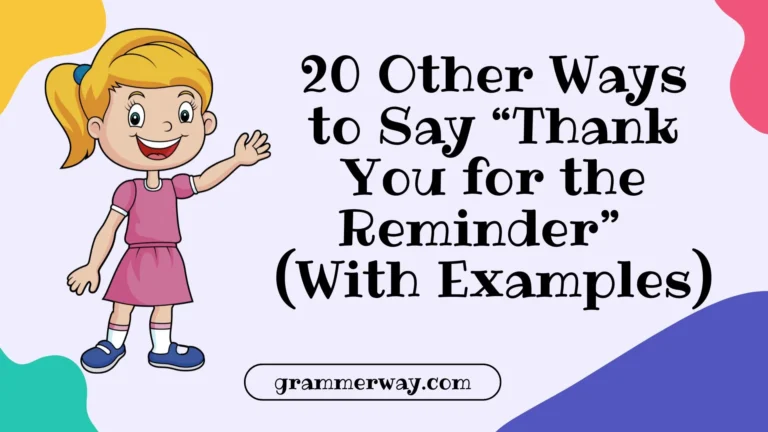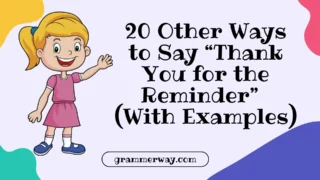Asking “How was your day?” is one of the simplest yet most meaningful ways to show someone that you care. However, when we repeat the same question every day, it can start to feel routine or empty. Finding other ways to say “How was your day” helps you express warmth, attention, and genuine interest in a more personal way. These alternatives can make conversations feel more heartfelt, comforting, and engaging, allowing the person you’re speaking to feel truly seen and valued.
What Does “How Was Your Day” Mean?
The phrase “How was your day” is a simple expression used to ask someone about their daily experiences, feelings, or events. It’s often said with kindness and curiosity to check in and show care. However, while it’s polite and friendly, using the same words repeatedly can sound automatic. By exploring new and thoughtful ways to ask, you can create a more genuine and emotionally connected conversation that reflects your sincerity and warmth.
Is It Professional/Polite to Say “How Was Your Day”?
Yes, it’s both professional and polite to say “How was your day,” especially in friendly or casual settings like workplaces or among friends. However, if you want to sound more personal or empathetic, you can choose alternatives that suit your tone and relationship. In professional environments, you might prefer phrases like “How has your day been treating you?” or “How are things going for you today?”—these sound more polished yet still friendly. In personal settings, warmer alternatives can express deeper emotional care.
Synonyms for “How Was Your Day”
- How’s everything going for you today
- How have things been going for you
- What have you been up to today
- How did your day go
- Did you have a good day
- How’s life treating you
- What was the best part of your day
- How are you doing today
- What made you smile today
- How are you feeling about today
- How’s your evening going
- How are things on your end
- How did everything go today
- What kind of day did you have
- How’s everything been lately
- Anything interesting happen today
- How are you holding up today
- How did your morning go
- What kind of day are you having
- How’s your afternoon been
1. How Have Things Been Going for You?
Meaning: This phrase gently invites someone to share how their recent experiences have been overall, not just today.
Scenario: You can use it when talking to a friend, coworker, or partner to show genuine curiosity about their well-being.
Examples:
- “Hey, how have things been going for you lately? I’ve missed hearing from you.”
- “It’s been a while! How have things been going for you?”
- “How have things been going for you at work these days?”
- “I was thinking about you — how have things been going for you emotionally?”
- “How have things been going for you since we last spoke?”
Tone: Warm, caring, and conversational.
Explanation: This alternative helps open deeper conversations because it focuses on how the person feels overall, not just their daily events. It encourages openness and sincerity, creating emotional closeness and comfort.
2. How Has Your Day Been Treating You?
Meaning: A polite and creative twist that asks how someone’s day has felt rather than just what happened.
Scenario: Great for work chats or gentle evening conversations.
Examples:
- “Hey! How has your day been treating you so far?”
- “You look a bit tired—how has your day been treating you?”
- “How has your day been treating you at the new job?”
- “It’s good to see you—how has your day been treating you today?”
- “How has your day been treating you after all those meetings?”
Tone: Friendly and polite with a touch of empathy.
Explanation: This phrase subtly shifts focus from activities to emotions, showing that you care about how the person feels rather than just what they did.
3. What Was the Best Part of Your Day?
Meaning: This question draws attention to positivity and invites the other person to share something uplifting.
Scenario: Perfect for evening talks with loved ones or when cheering someone up.
Examples:
- “So tell me, what was the best part of your day?”
- “I’d love to know—what was the best thing that happened to you today?”
- “What was the highlight of your day?”
- “You’ve been busy today—what moment made you smile?”
- “Before we wrap up, what was the best part of your day?”
Tone: Positive, engaging, and caring.
Explanation: This phrasing encourages gratitude and reflection, creating warm, meaningful dialogue and helping someone focus on joyful moments.
4. How Are You Holding Up Today?
Meaning: A compassionate question that shows concern for someone’s emotional state or stress level.
Scenario: Use this when you sense someone might be tired or overwhelmed.
Examples:
- “You’ve had a long week—how are you holding up today?”
- “How are you holding up after that big presentation?”
- “It’s been hectic lately, hasn’t it? How are you holding up?”
- “Just checking in—how are you holding up emotionally?”
- “How are you holding up with everything going on?”
Tone: Gentle, empathetic, and supportive.
Explanation: This phrase adds emotional sensitivity, showing that you care about their feelings rather than just their activities.
5. How’s Everything Going for You Today?
Meaning: A friendly and balanced way to ask about both mood and happenings.
Scenario: Ideal for casual conversations or workplace check-ins.
Examples:
- “Hey, how’s everything going for you today?”
- “How’s everything going for you at work?”
- “How’s everything going for you with that new project?”
- “How’s everything going for you since the move?”
- “How’s everything going for you this week?”
Tone: Neutral, polite, and conversational.
Explanation: This phrase fits almost any context, keeping the tone open while inviting detailed responses.
6. What Kind of Day Are You Having?
Meaning: A friendly question that encourages the other person to describe their day naturally.
Scenario: Good for close friends, family, or casual check-ins.
Examples:
- “Hey there, what kind of day are you having so far?”
- “What kind of day are you having at work today?”
- “What kind of day are you having—busy or calm?”
- “I’m curious, what kind of day are you having today?”
- “So, what kind of day has it been for you?”
Tone: Easygoing and sincere.
Explanation: This form allows the listener to express feelings freely, whether positive or challenging, and keeps the tone natural and thoughtful.
7. How’s Your Evening Going So Far?
Meaning: A warm variation used later in the day to show you care about someone’s comfort or relaxation.
Scenario: Perfect for evening conversations, especially with partners or friends.
Examples:
- “Hey love, how’s your evening going so far?”
- “How’s your evening going after that long day?”
- “I hope you’re relaxing—how’s your evening going?”
- “How’s your evening going, any plans?”
- “Just checking in—how’s your evening going so far?”
Tone: Relaxed, kind, and affectionate.
Explanation: This phrase shows attentiveness and understanding, helping maintain emotional connection during evening moments.
8. What Have You Been Up To Today?
Meaning: This friendly phrase encourages someone to share details about their activities or experiences throughout the day.
Scenario: Ideal for casual conversations with friends, coworkers, or family members when you want to sound genuinely interested.
Examples:
- “Hey! What have you been up to today?”
- “You seem busy—what have you been up to since morning?”
- “What have you been up to today? Anything exciting or new?”
- “I’ve missed chatting—what have you been up to today?”
- “So, what have you been up to this afternoon?”
Tone: Curious, light-hearted, and friendly.
Explanation: This phrase shifts the focus to what someone has done instead of how they feel, yet still invites open and thoughtful sharing in a kind and engaging manner. It shows curiosity and keeps conversations lively without sounding repetitive or dull.
9. How Did Your Day Go?
Meaning: A simple yet genuine way to ask about the overall flow of someone’s day.
Scenario: Perfect for end-of-day talks or check-ins when someone is wrapping up work or heading home.
Examples:
- “Hey, how did your day go?”
- “How did your day go with that new client?”
- “How did your day go? You seem more relaxed now.”
- “I’m curious—how did your day go today?”
- “How did your day go after the meeting?”
Tone: Calm, conversational, and warm.
Explanation: This phrase feels natural and emotionally present. It acknowledges the day’s completion, making the person feel that their experiences are worth sharing and valued by you.
10. How’s Life Treating You These Days?
Meaning: A broader question that goes beyond daily updates and focuses on someone’s general well-being.
Scenario: Great for reconnecting with friends or checking in after some time apart.
Examples:
- “It’s been a while! How’s life treating you these days?”
- “How’s life treating you lately? You’ve been on my mind.”
- “How’s life treating you these days with all the changes happening?”
- “How’s life treating you, my friend?”
- “Hey there, how’s life treating you these days?”
Tone: Thoughtful, caring, and slightly nostalgic.
Explanation: This phrase feels warm and genuine because it extends care beyond one day. It shows long-term concern and emotional attentiveness toward the person’s overall journey and happiness.
11. How Are Things on Your End?
Meaning: A professional yet kind way to check in on someone’s situation or progress.
Scenario: Suitable for workplace emails, polite conversations, or long-distance friendships.
Examples:
- “Hi! How are things on your end?”
- “Just checking in—how are things on your end these days?”
- “How are things on your end? Hope everything’s going smoothly.”
- “How are things on your end with the project updates?”
- “How are things on your end—any good news to share?”
Tone: Respectful, professional, and composed.
Explanation: This phrase balances friendliness and professionalism. It’s perfect for work or polite chats because it expresses interest without intruding into someone’s personal space.
12. What Made You Smile Today?
Meaning: A beautiful and positive alternative that focuses on joyful or memorable moments.
Scenario: Great for evening reflections or comforting conversations with someone you care about.
Examples:
- “Hey, what made you smile today?”
- “Before bed, tell me—what made you smile today?”
- “What made you smile today? I love hearing the happy parts.”
- “You seem cheerful—what made you smile today?”
- “I’d love to know, what made you smile today?”
Tone: Gentle, uplifting, and affectionate.
Explanation: This phrase highlights gratitude and positivity. It helps shift attention to good emotions, deepening emotional connection and making the conversation feel heartwarming and genuine.
13. How Are You Feeling About Today?
Meaning: A sensitive question that invites someone to express their emotions about the day’s events.
Scenario: Ideal for emotional conversations or when someone seems off or overwhelmed.
Examples:
- “You’ve had a big day—how are you feeling about today?”
- “How are you feeling about today’s results?”
- “I care about how you feel—how are you feeling about today?”
- “How are you feeling about today after everything that happened?”
- “So, how are you feeling about today overall?”
Tone: Gentle, empathetic, and reflective.
Explanation: This version allows deeper emotional sharing. It shows that you care about their inner world, encouraging authenticity and trust in the conversation.
14. How Did Everything Go Today?
Meaning: A polite, complete-sounding question that fits both professional and personal chats.
Scenario: Perfect when asking about a specific event, task, or workday.
Examples:
- “How did everything go today with the client?”
- “How did everything go today? You look a bit relieved.”
- “How did everything go today—did it all work out?”
- “How did everything go today at school?”
- “How did everything go today? I know it was important.”
Tone: Balanced, thoughtful, and supportive.
Explanation: It conveys attentiveness without prying. This phrase makes people feel that you remember what matters to them, showing care and reliability in your communication.
15. What Kind of Day Did You Have?
Meaning: A rephrased version that adds warmth and curiosity while sounding refreshingly different.
Scenario: Great for evening check-ins with close friends or family.
Examples:
- “What kind of day did you have?”
- “Tell me, what kind of day did you have today?”
- “What kind of day did you have—peaceful or chaotic?”
- “I’d love to know, what kind of day did you have?”
- “You seem happy—what kind of day did you have?”
Tone: Personal, cozy, and reflective.
Explanation: This phrase feels conversational and intimate, helping the person reflect and share naturally about how their day unfolded.
16. How Did Your Morning/Afternoon Go?
Meaning: A more specific way to ask about part of someone’s day.
Scenario: Use this when you want to sound attentive and focused on detail.
Examples:
- “How did your morning go today?”
- “How did your afternoon go with those meetings?”
- “How did your morning go—did everything run smoothly?”
- “How did your afternoon go after lunch?”
- “How did your morning go? I hope it started off well.”
Tone: Attentive, kind, and polite.
Explanation: This approach shows you’ve been paying attention and care about smaller parts of their day. It feels thoughtful and personal, making your words more memorable.
17. Did You Have a Good Day?
Meaning: A simple, positive version that keeps the tone upbeat and friendly.
Scenario: Commonly used in both casual and caring contexts.
Examples:
- “Did you have a good day today?”
- “I hope you had a good day—how was it?”
- “Did you have a good day at work?”
- “Did you have a good day, love?”
- “So, did you have a good day overall?”
Tone: Cheerful, gentle, and caring.
Explanation: This phrase is light yet kind. It opens the door for sharing positive details while still allowing room for honesty and real feelings.
18. Anything Interesting Happen Today?
Meaning: A fun and curious question that invites storytelling or unique updates.
Scenario: Use this with friends or colleagues to spark easy, engaging chats.
Examples:
- “So, anything interesting happen today?”
- “Tell me, anything interesting happen at work?”
- “Anything interesting happen today worth sharing?”
- “You look amused—anything interesting happen today?”
- “Hey, anything interesting happen that made you laugh?”
Tone: Playful, relaxed, and conversational.
Explanation: It adds variety and energy to conversations, making people feel comfortable sharing stories, surprises, or fun details from their day.
19. How’s Everything Been Lately?
Meaning: A friendly phrase that goes beyond just today and covers recent days or weeks.
Scenario: Excellent for reconnecting or casual chats after some time apart.
Examples:
- “Hey, how’s everything been lately?”
- “How’s everything been lately at work?”
- “How’s everything been lately with you and your family?”
- “I’ve missed catching up—how’s everything been lately?”
- “How’s everything been lately? You seem happier.”
Tone: Warm, caring, and relaxed.
Explanation: This phrase builds a bridge for deeper conversations, showing that your interest extends beyond one day and includes their overall well-being.
20. How Are You Doing Today?
Meaning: A timeless, kind question that expresses both concern and friendliness.
Scenario: Ideal for any setting—personal, professional, or casual.
Examples:
- “Hey, how are you doing today?”
- “How are you doing today with everything going on?”
- “I just wanted to check—how are you doing today?”
- “How are you doing today? You’ve been quiet.”
- “How are you doing today after such a long week?”
Tone: Kind, polite, and universally warm.
Explanation: Though simple, this phrase never loses its charm. It invites genuine connection and makes the listener feel valued and seen, especially when said with sincerity.
Conclusion
Finding other ways to say “How was your day” helps you speak with more emotion, empathy, and variety. The words you choose can make ordinary check-ins feel thoughtful and caring. Whether you’re talking to a partner, friend, coworker, or family member, these alternatives show that your interest goes beyond habit—it’s heartfelt. When your words carry warmth, your relationships grow stronger, and your conversations become more meaningful every single day.
FAQs
1. Why should I use alternatives to “How was your day”?
Using alternatives keeps your conversations fresh and shows genuine care, helping others feel valued and heard.
2. Are these alternatives suitable for texting?
Yes, all these phrases sound natural in both spoken and written form, especially in warm text conversations.
3. Which phrase works best for professional settings?
Phrases like “How are things on your end?” or “How has your day been treating you?” are polished yet friendly.
4. How can I sound more caring when asking about someone’s day?
Add personal context, like mentioning something they told you earlier, and use soft, empathetic tone choices.
5. Can I mix these alternatives to avoid repetition?
Absolutely! Switching between these 20 options keeps your conversations sincere, varied, and emotionally engaging.
Emma Brooke is a content writer at GrammerWay, specializing in English grammar, writing clarity, and common language errors. She creates easy-to-follow guides that help readers write accurately and confidently.







Leave a Comment